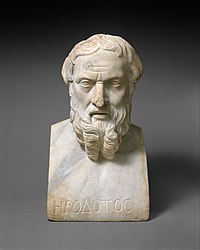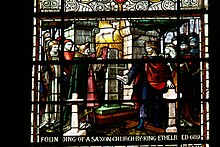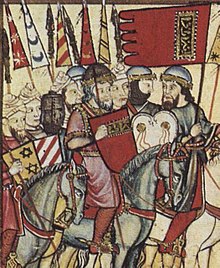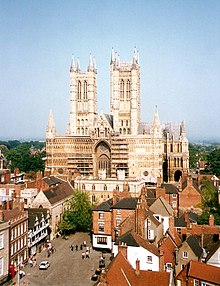Portal:History
The History Portal

Herodotus (c. 484 BC – c. 425 BC) is often
considered the "father of history"
History is the systematic study of the past. As an academic discipline, it analyzes and interprets evidence to construct narratives about what happened and explain why it happened, focusing primarily on the human past. Some theorists categorize history as a social science, while others see it as part of the humanities or consider it a hybrid discipline. Similar debates surround the purpose of history, for example, whether its main aim is theoretical, to uncover the truth, or practical, to learn lessons from the past. In a slightly different sense, the term history refers not to an academic field but to the past itself or to individual texts about the past.
History is a broad discipline encompassing many branches. Some focus on specific time periods, such as ancient history, while others concentrate on particular geographic regions, such as the history of Africa. Thematic categorizations include political history, social history, and economic history. Branches associated with specific research methods include quantitative history, comparative history, and oral history.
Historical research relies on primary and secondary sources to reconstruct past events and validate interpretations. Source criticism is used to evaluate these sources, assessing their authenticity, content, and reliability. Historians integrate the perspectives of several individual sources to develop a coherent narrative. Different schools of thought, such as positivism, the Annales school, Marxism, and postmodernism, have distinct methodological approaches.
History emerged as a field of inquiry in the ancient period to replace myth-infused narratives, with influential early traditions originating in Greece, China, and later also in the Islamic world. Historical writing evolved throughout the ages and became increasingly professional, particularly during the 19th century, when a rigorous methodology and various academic institutions were established. History is related to many fields, including historiography, philosophy, education, and politics. (Full article...)
Featured picture
Did you know (auto generated)

- ... that the 1931 Valentine earthquake was the strongest earthquake in recorded history to hit Texas?
- ... that Timo Meier became the first player in San Jose Sharks franchise history to score five goals in one game when he was 25?
- ... that West Auckland is home to the largest stratovolcano in the geologic history of New Zealand?
- ... that the Blemyomachia is an epic poem describing a historical clash between the Roman Empire and the Blemmyes in the Nile valley?
- ... that the Pulitzer jury said that Ford Strikers Riot is "a brutal picture, it sums up much of the labor history of 1941"?
- ... that Seattle Reign FC have had three name changes during their 11-year history?
Alexander of Lincoln (died February 1148) was a medieval English Bishop of Lincoln, a member of an important administrative and ecclesiastical family. He was the nephew of Roger of Salisbury, a Bishop of Salisbury and Chancellor of England under King Henry I, and he was also related to Nigel, Bishop of Ely. Educated at Laon, Alexander served in his uncle's diocese as an archdeacon in the early 1120s. Unlike his relatives, he held no office in the government before his appointment as Bishop of Lincoln in 1123. Alexander became a frequent visitor to King Henry's court after his appointment to the episcopate, often witnessing royal documents, and he served as a royal justice in Lincolnshire.
Although Alexander was known for his ostentatious and luxurious lifestyle, he founded a number of religious houses in his diocese and was an active builder and literary patron. He also attended church councils and reorganised his diocese by increasing the number of archdeaconries and setting up prebends to support his cathedral clergy. Under Henry's successor, King Stephen, Alexander was caught up in the fall from favour of his family, and was imprisoned together with his uncle Roger in 1139. He subsequently briefly supported Stephen's rival, Matilda, but by the late 1140s Alexander was once again working with Stephen. He spent much of the late 1140s at the papal court in Rome, but died in England in early 1148. During his episcopate he began the rebuilding of his cathedral, which had been destroyed by fire. Alexander was the patron of medieval chroniclers Henry of Huntingdon and Geoffrey of Monmouth, and also served as an ecclesiastical patron of the medieval hermit Christina of Markyate and Gilbert of Sempringham, founder of the Gilbertines. (Full article...)
On this day
February 12: Lantern Festival in China (2025); Lincoln's Birthday in some parts of the United States; Red Hand Day
- 1691 – A papal conclave convened to select a new pope after the death of Pope Alexander VIII.
- 1924 – George Gershwin's composition Rhapsody in Blue premiered at Aeolian Hall in New York.
- 1994 – Edvard Munch's painting The Scream (pictured) was stolen from the National Gallery of Norway.
- 2003 – Protesters in La Paz and the Bolivian government brokered a deal to end two days of rioting against a proposed salary tax.
- Ethan Allen (d. 1789)
- Charles Darwin (b. 1809)
- Bill Russell (b. 1934)
- Anna Anderson (d. 1984)
Selected quote
There cannot be two suns in the sky, nor two emperors on the earth.
— Confucius, Chinese Sage and Philosopher
Related portals
More Did you know...
- ... that the underground Fortress of Mimoyecques (pictured) was built by Nazi Germany to bombard London with 10 shells a minute using the V-3 supergun?
- ... that Howard P. Perry was the first African American recruit in the United States Marine Corps?
- ... that the Chester city walls form the most complete circuit of Roman and medieval defensive town walls in Britain?
- ... that China's first female director was adopted by the first Premier of the People's Republic of China?
- ... that the Medieval Merchant's House in Southampton was being used as a brothel when bomb damage during the Blitz revealed the building's important medieval architecture?
- ... that the Sumerian "river of paradise", the Hubur, derived partly from real geography before becoming a demonic fantasy?
- ... that Bill Foley's photograph "The Last Smile" shows Anwar Sadat only moments before his assassination?
- ... that the 1911 Sarez earthquake triggered a huge landslide, forming the tallest dam in the world?
Topics
Categories

History • By period • By region • By topic • By ethnic group • Historiography • Archaeology • Books • Maps • Images • Magazines • Organizations • Fictional • Museums • Pseudohistory • Stubs • Timelines • Chronology • People • Wikipedia historians
WikiProjects
![]() WikiProject History •
Ancient Near East • Australian History • Classical Greece and Rome • Dacia • Former countries • History of Canada • Chinese history • European history • Heraldry and vexillology • Indian history • Jewish history • Medieval Scotland • Mesoamerica • Military history • Middle Ages • History of Science
WikiProject History •
Ancient Near East • Australian History • Classical Greece and Rome • Dacia • Former countries • History of Canada • Chinese history • European history • Heraldry and vexillology • Indian history • Jewish history • Medieval Scotland • Mesoamerica • Military history • Middle Ages • History of Science
WikiProject Time • Days of the Year • Years
WikiProject Biography • Composers • Political figures • Saints • United States Presidents
Things you can do
 |
Here are some tasks awaiting attention:
|
Associated Wikimedia
The following Wikimedia Foundation sister projects provide more on this subject:
-
Commons
Free media repository -
Wikibooks
Free textbooks and manuals -
Wikidata
Free knowledge base -
Wikinews
Free-content news -
Wikiquote
Collection of quotations -
Wikisource
Free-content library -
Wikiversity
Free learning tools -
Wiktionary
Dictionary and thesaurus





























![Image 15 Apollo 11 Photograph credit: Neil Armstrong Apollo 11 was the fifth crewed mission of NASA's Apollo program. After launching from the Kennedy Space Center in Florida on July 16, 1969, commander Neil Armstrong and Apollo Lunar Module pilot Buzz Aldrin landed Eagle in Mare Tranquillitatis on July 20, at 20:17:40 UTC, while command module pilot Michael Collins remained on Columbia in lunar orbit. Armstrong was the first to exit the spacecraft, stepping onto the surface 6 hours and 39 minutes later, on July 21, at 02:56:15 UTC; nineteen minutes later, Aldrin joined him on extravehicular activity, which lasted 2 hours, 31 minutes and 40 seconds. Armstrong and Aldrin lifted off from Tranquility Base after almost 22 hours on the lunar surface and rejoined Collins in the command module, before splashing down in the Pacific Ocean on July 24. The mission was planned to the minute, with the majority of the photographic tasks performed by Armstrong with a single Hasselblad camera. Most of the photographs taken on the Moon that include an astronaut are of Aldrin; there are only five images of Armstrong partly shown or reflected, as in this photograph, with Armstrong and the lunar module reflected in Aldrin's helmet visor. "As the sequence of lunar operations evolved," Aldrin explained, "Neil had the camera most of the time [...] It wasn't until we were back on Earth and in the Lunar Receiving Laboratory looking over the pictures that we realized there were few pictures of Neil." More featured pictures](http://upload.wikimedia.org/wikipedia/commons/thumb/9/98/Aldrin_Apollo_11_original.jpg/119px-Aldrin_Apollo_11_original.jpg)

























